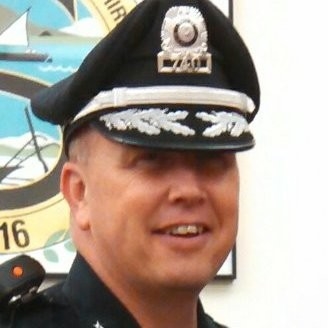By PAULA TRACY, InDepthNH.org
CONCORD – Two hours of diversity training for each police recruit is not enough, John Scippa the director of NH Police Standards and Training told a new police accountability commission on Thursday.
Scippa said the training should be an ongoing theme throughout officer’s instruction.
Every law enforcement officer in the state attends a 16-week residential program in Concord and each department sends recruits after a rigorous hiring process. The academy and its 594.2 hours of training is funded through the state’s general fund.
There is also annual in-service training offered for all police officers, eight hours in length, which includes a firearms test.
Gov. Chris Sununu has called for the commission to review all police curricula, training and procedures in light of protests against racial injustice at the hands of police this summer in New Hampshire and across the world.
It was sparked by the videotaped death of George Floyd, an African American who was killed in custody by a white police officer in Minneapolis on Memorial Day weekend.
The state does not train choke-holds, said Scippa. He told the Commission on Law Enforcement Accountability, Community and Transparency it can only be used in a life-or-death situation as a lethal force but it is not a trained technique in New Hampshire to restrain people in custody.
He recommended adding two types of new training, which are nationally recognized on how police should react to fellow police misconduct, developed by the New Orleans Police called EPIC (an acronym for Ethical Policing Is Courageous) and a national “Fair and Impartial Training Model” for diversity training.
He also said wellness training for police, for mental and physical health, could be improved in New Hampshire.
Scippa told the commission Thursday that there would be added costs and perhaps more time in class and practical, scenario-based training and in-service training. EPIC training would add eight hours at the academy and four hours to in-service training and the Fair and Impartial Training Model would mean an additional block of instruction though the number of hours was not specified in the presentation.
Scippa used to teach police in Massachusetts and started his job at the academy just as the pandemic unfolded in March.
Overall, he said, New Hampshire is well-served by its uniform police training but diversity is “now siloed” in just two hours of training and should become more a “theme” or part of the culture of police training throughout all aspects of training.
James McKim, president of the NAACP, said it might be good to address “the systemic mind field we live in,” as well as diversity training. He made the analogy of a cut.
“If someone has a cut you don’t treat the whole body, you treat the cut, head-on,” McKim said.
Scippa said that he did not quite understand but would welcome discussing that “offline” with McKim and later was asked and confirmed that he would relay that information to the commission in full transparency.
New Hampshire has a 24-hour block of training on mental illness dynamics and a six-hour block on communications and de-escalation techniques. It also has more than 100 hours of use of force training.(ie, firearms training.)
He cautioned to make changes “correctly, and not quickly” and not to do it just to say you did something.
A copy of the Powerpoint presentation can be found here:
https://www.governor.nh.gov/sites/g/files/ehbemt336/files/documents/20200625-chief-john-scippa.pdf
Sununu has given the commission 45 days to come up with recommendations that can be implemented or made into legislation.
“This is a tremendous opportunity for us to work together…we are going to come away from this process with a new, better vision and I am just excited to be part of it,” Scippa said.
Londonderry Police Lt. Mark Morrison of the New Hampshire Police Association, said police are pleased to work on improving their techniques and he lauded Scippa. He asked Scippa to explain why it is important to teach physical tasks in extraordinary and dangerous conditions and the repetition of the training is essential.
“In some cases, they will literally fight for their life,” Scippa said. “You have to be, unfortunately, able to be prepared,” to use lethal force.
Joseph Lascaze, of the ACLU-NH and a member of the commission, asked Scippa a number of questions related to police behavior and accountability. Scippa said if a police officer is suspected of a crime or arrested, reporting is required to Police Standards and reviewed.
Police chiefs are also required to inform NHPST of any status change for any police officer, for example, if an officer was demoted, terminated or resigns in lieu of termination.
Is there any training on legal limitations of detaining people for suspected federal immigration violations, Lacaze asked.
Yes, and New Hampshire is on the cutting edge of that, Scippa said, but he was not sure if it was included in the training and he would do some research.
Police are guardians, Scippa said, and not trained the same as the military. Former military people, those who have been under fire are much more worldly and experienced in the importance of de-escalation, Scippa said.
Julian Jefferson, staff attorney at the New Hampshire Public Defender’s office, speaking personally, said some of his family members are law enforcement officers and most police are good people. But, he said, New Hampshire cannot say it has little or no issues with respect to police assaulting people. He gave two examples of a problem that needs to be confronted:
A senior police officer said that if a suspect is being chased, “they are going to get a few lumps” and a drunk suspect, flailing his arms hit an officer in the face and was brutally attacked.
“I found it great to hear that you do not train…on chokehold but we need to take an expressed policy of banning it,” Jefferson said, noting there is legislation toward that end.
He also said they should call it “race relations” rather than “diversity training.”
Scippa asked if there was any report of those allegations in his two scenarios?
No, said Jefferson, “and that is not an isolated incident.”
There would be a duty to intervene, Scippa said. Jefferson said it is part of a culture and that needs to be broken down.
“We can only act on what we know,” Scippa said.
New Hampshire is the third whitest state in the nation, said Jefferson, and minorities are indeed, just that.
“Implicit biases need to be treated head-on,” Jefferson said.
Scippa said he agreed. The meeting ended within the time frame with two public members, Eddie Edwards and Ronelle Tshiela still waiting a chance to ask questions.
They will be able to ask questions to Scippa on Friday along with presentations from Hanover Police Chief Charles Dennis, president of the New Hampshire Association of Chiefs of Police and
Nathan Noyes, the new State Police colonel.
The commission will also take public testimony by phone Friday at 2 p.m.. More information can be obtained here: https://www.governor.nh.gov/accountability
The Commission requests that members of the public wishing to present testimony email the Commission in advance of the hearing at: LEACT@doj.nh.gov.
The Commission strongly encourages the submission of written testimony in advance of the hearing at the same email address. Please note: emails sent to this address, including attached documents or other media, are considered public and will be included on the website, as part of the written testimony considered by the Commission.
Call-in: 1-800-356-8278 or 1-857-444-0744
Enter one of the following 6 digit conference codes:
570417
146910
858342
When prompted, clearly state your first and last name as well as if you are a member of the public or which organization/agency you represent.
Any member of the public having difficulty accessing the telephonic public meeting should contact the Department of Justice at (603) 271-1202.





